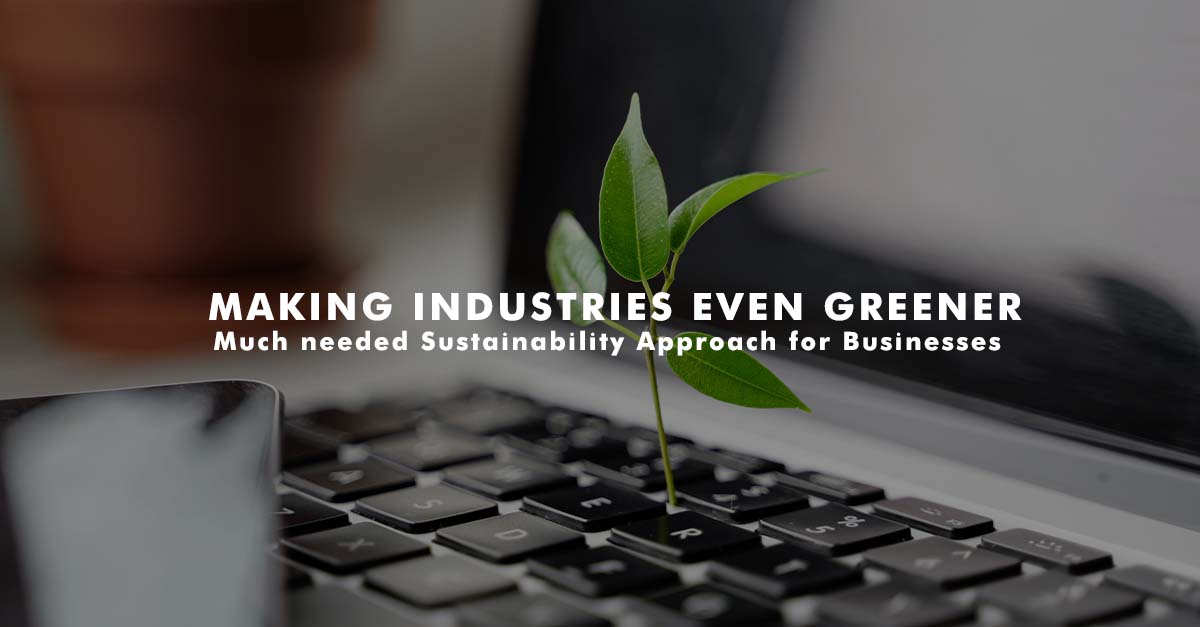
Making Industries Even Greener: Much needed Sustainability Approach for Businesses
“Sustainability is an increasing phenomenon in the business practices. And implementing sustainability approach in the business practices not only helps to achieve business profits; but also enhances the business reputation and provides a competitive advantage.”
Sustainability is a set of practices that uses the present resources without compromising future needs.
These days, sustainability is becoming an integral part of business practices.
While climate change is on a surge, sustainable business practices are rising among organizations; owing to its impeccable benefits that include business reputational achievements, reduced costs, and increased efficiency.
While a decade ago, where businesses were susceptible to invest in sustainable business practices; the rise in temperatures and growing concerns about climate change has resulted in organizations investing in sustainable practices more than ever.
Implementing a sustainability approach involves business owners, administrators, leaders, among others.
While ESG Investing becomes one of the critical components of sustainability practices; embedding greener sustainable practices act as a significant imperative in achieving sustainable business practices.
Sustainable Business Practices – A Must-Have Elements for the Businesses:
Sustainable business practices play a crucial role in the significant business decisions of an organization.
While the businesses focus on devising strategies to achieve business goals; it is also a combined effort to make the organization and the business practices environmentally aware and attain profits; competency surged sales figures and reputation among the competitors.
Business sustainability refers to the set of practices that an organization implements without negatively impacting the environment.
It is a practice that considers stakeholders and builds practices that lead to a global environment; and a community of leaders that helps thrive the business.
An environmentally aware business focuses on achieving its business goals through its business practices to support the economy and the planet as a whole by committing to environmentally friendly businesses.
According to a recent research study conducted on several organizations, the businesses will produce 27 billion tons of solid waste by 2050 due to a business environment that prioritizes rapid production of non-biodegradable for maximum profits.
Furthermore, the unchecked CO2 emissions contribute to a temperature rise of two degrees Celsius by 2050; which will cause sea levels to rise and catastrophic weather events to increase.
Improving sustainability approach and sustainable practices to combat climate change and temperature surge is a massive task for the upper management.
A combination of all the stakeholders right from the employees; business administrators, business managers, and human resource managers, leads to effective sustainable business practice.
These continuous efforts combined with robust, comprehensive strategies result in achieving an overall business performance through sustainability.
Much Needed Sustainability Approach For Businesses:
Having a sustainability approach in the existing business units is easier said than done.
Implementing sustainable business practices is not as easy as it looks as it involves a plethora of business units and business strategies that affect not only the lower and mid-level stakeholders but also the upper management executives.
With sustainability, the organizations reap certain benefits and achieve business competency among their competitors.
Reduced Business Costs:
Greening the business practices is a tedious task; involving a set of business units and business processes to align with sustainable practices.
It is also time-consuming and results in a higher initial cost, but it helps in money savings while enhancing business reputation.
According to a recently conducted survey about sustainability, 33% of businesses integrate sustainable practices to improve operationally; efficiency, and cut costs.
Improved Business Reputation:
Just like cost savings define profitability, sustainable business practices paves a way for an improved business reputation among the organizations.
Corporates with an environmentally committed service are viewed positively in the market.
Consumers prefer environmentally friendly products, but the sustainability index such as DJSI and MSCI also rates such companies higher among its competitors, enabling them to achieve g business reputation.
Provides Competitive Advantage:
Organizations with sustainable practices in place help in achieving a competitive advantage over their competitors.
According to a recent survey from S&P, the organizations with sustainable business practices achieve an 18% higher ROI than those without a set of sustainable business practices.
Increases Bottom Line:
Organizations with a comprehensive business model focussing on sustainable business practices result in overall productivity.
A set of environmentally committed priorities, including innovative strategies, and improved business performance, enables organizations to achieve g an enhanced triple bottom line.
Stakeholders’ Engagement:
Like other business practices, sustainability is also achieved by the stakeholders’ engagement and active participation of the various stakeholders, from employees to the C-level executives.
Digitally driven decisions coupled with the sustainability touch helps in achieving sustainable goals with the overall inclusion of the stakeholders.
Conclusion:
Sustainability is another business practice and a set of well-defined environmentally committed rules that enhance the business practices while saving up resources.
Achieving sustainable business practice is a significant priority among organizations due to its robust benefits, such as increased business productivity and enhanced reputation among competitors.
However, amalgamating various resources and stakeholders leads to a sustainable business practice that improves business performance without compromising resource usage and sales figures.





